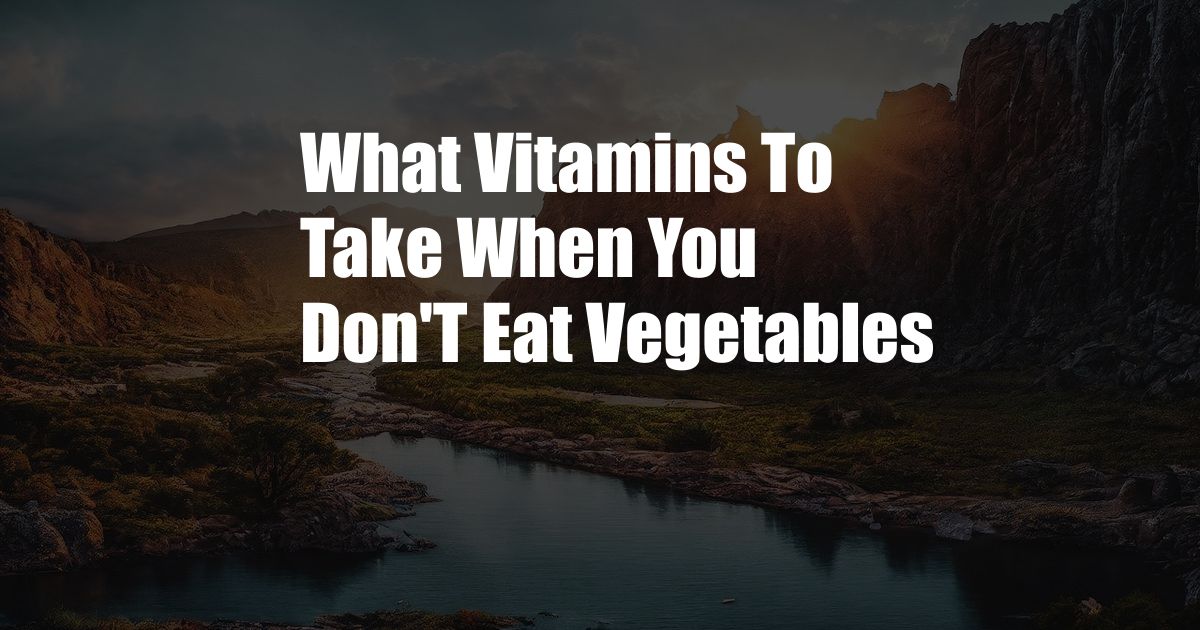
What Vitamins to Take When You Don’t Eat Vegetables
I used to be a vegetable hater. I would eat them only when my mom forced me to, and even then, I would try to hide them in my napkin or under the table. As I got older, I started to realize that vegetables are actually pretty important for your health. They’re packed with vitamins, minerals, and fiber, which are all essential for good health. But even though I knew that I should be eating more vegetables, I still couldn’t bring myself to do it. I just didn’t like the taste.
One day, I was talking to my doctor about my vegetable aversion, and she told me that there are actually a lot of people who don’t like vegetables. She said that there are a few reasons for this, including genetics, taste preferences, and texture issues. She also said that there are a lot of ways to get the nutrients you need from vegetables without actually eating them. You can take supplements, drink smoothies, or eat fruits and whole grains.
Why You Need Vitamins
Vitamins are essential nutrients that your body needs to function properly. They help your body convert food into energy, build and repair tissues, and regulate bodily functions. There are 13 essential vitamins, and each one has a specific role to play in your health. If you don’t get enough of a particular vitamin, you can develop a deficiency, which can lead to a variety of health problems.
Some of the most common vitamin deficiencies include:
- Vitamin A deficiency: Can lead to night blindness, dry eyes, and impaired immune function.
- Vitamin C deficiency: Can cause fatigue, weakness, and scurvy.
- Vitamin D deficiency: Can lead to weak bones, muscle weakness, and fatigue.
- Vitamin E deficiency: Can cause nerve damage, muscle weakness, and vision problems.
- Vitamin B12 deficiency: Can cause anemia, fatigue, and nerve damage.
The Best Vitamins for Non-Vegetable Eaters
If you don’t eat vegetables, it’s important to take a supplement to make sure you’re getting the vitamins you need. There are a variety of vitamin supplements available, but not all of them are created equal. When choosing a supplement, look for one that contains the following vitamins:
- Vitamin A
- Vitamin C
- Vitamin D
- Vitamin E
- Vitamin B12
You can also get these vitamins from fortified foods, such as cereals, breads, and milk. However, it’s important to note that fortified foods may not contain as much of a particular vitamin as a supplement.
Expert Advice
If you’re not sure which vitamin supplement is right for you, talk to your doctor. They can help you determine which vitamins you need and recommend a supplement that’s right for you.
In addition to taking a supplement, there are a few other things you can do to make sure you’re getting the nutrients you need. These include:
- Eating fruits and whole grains: Fruits and whole grains are good sources of vitamins, minerals, and fiber. Aim to eat at least five servings of fruits and vegetables per day.
- Drinking fortified beverages: Fortified beverages, such as milk and orange juice, are a good way to get extra vitamins and minerals. Look for beverages that are fortified with vitamin A, vitamin C, and vitamin D.
- Taking a multivitamin: A multivitamin can help you fill in any nutritional gaps in your diet. Multivitamins typically contain a variety of vitamins and minerals, including vitamin A, vitamin C, and vitamin D.
FAQs
Q: What are the best vitamins for non-vegetable eaters?
A: The best vitamins for non-vegetable eaters are vitamin A, vitamin C, vitamin D, vitamin E, and vitamin B12.
Q: How can I get the nutrients I need without eating vegetables?
A: You can get the nutrients you need without eating vegetables by taking a supplement, eating fruits and whole grains, drinking fortified beverages, or taking a multivitamin.
Q: Should I take a vitamin supplement if I don’t eat vegetables?
A: Yes, if you don’t eat vegetables, you should take a vitamin supplement to make sure you’re getting the nutrients you need.
Conclusion
If you don’t eat vegetables, it’s important to take steps to make sure you’re getting the vitamins you need. There are a variety of ways to do this, including taking a supplement, eating fruits and whole grains, drinking fortified beverages, and taking a multivitamin. Talk to your doctor to determine which option is right for you.
Are you interested in learning more about vitamins and supplements?